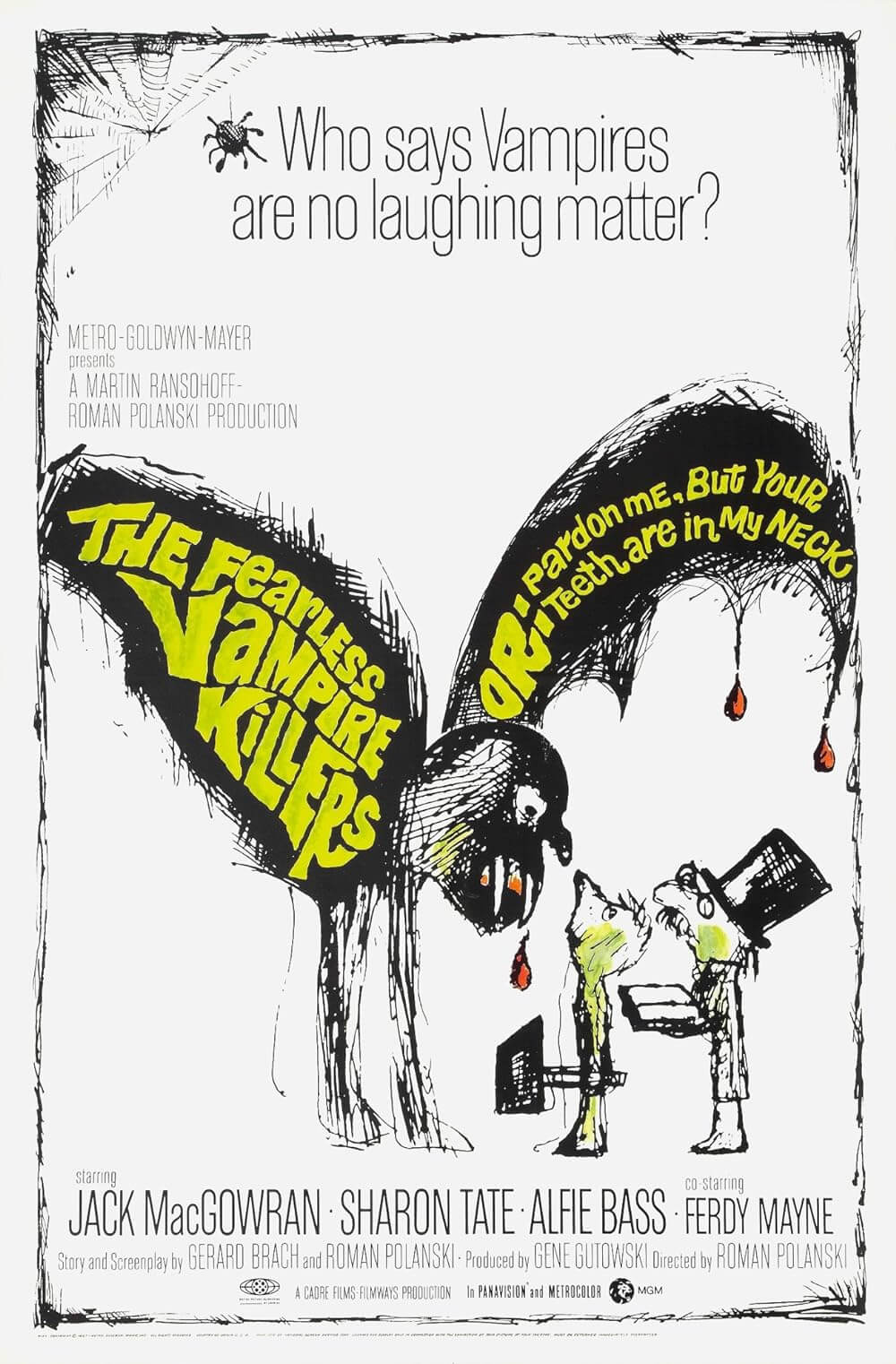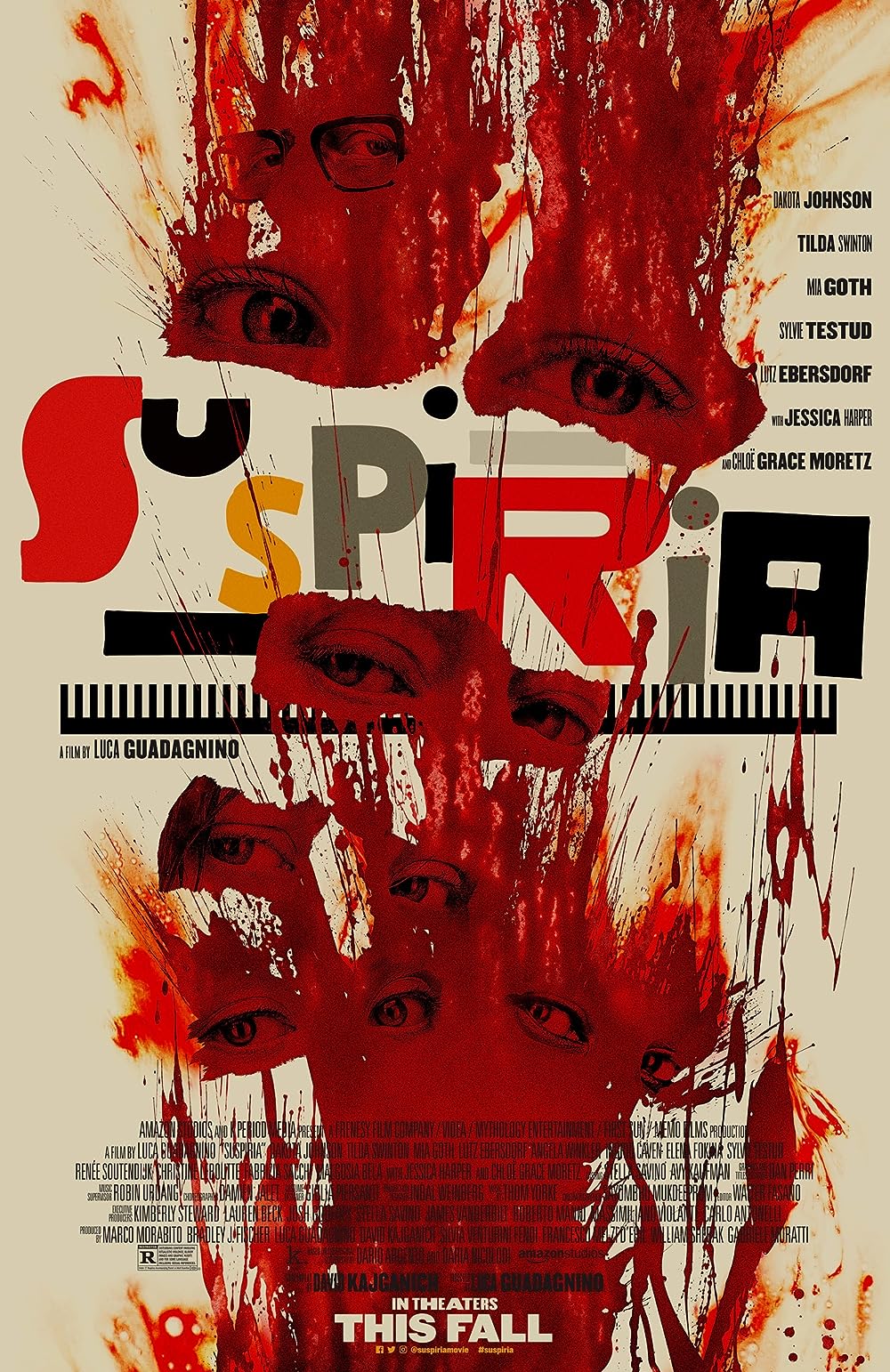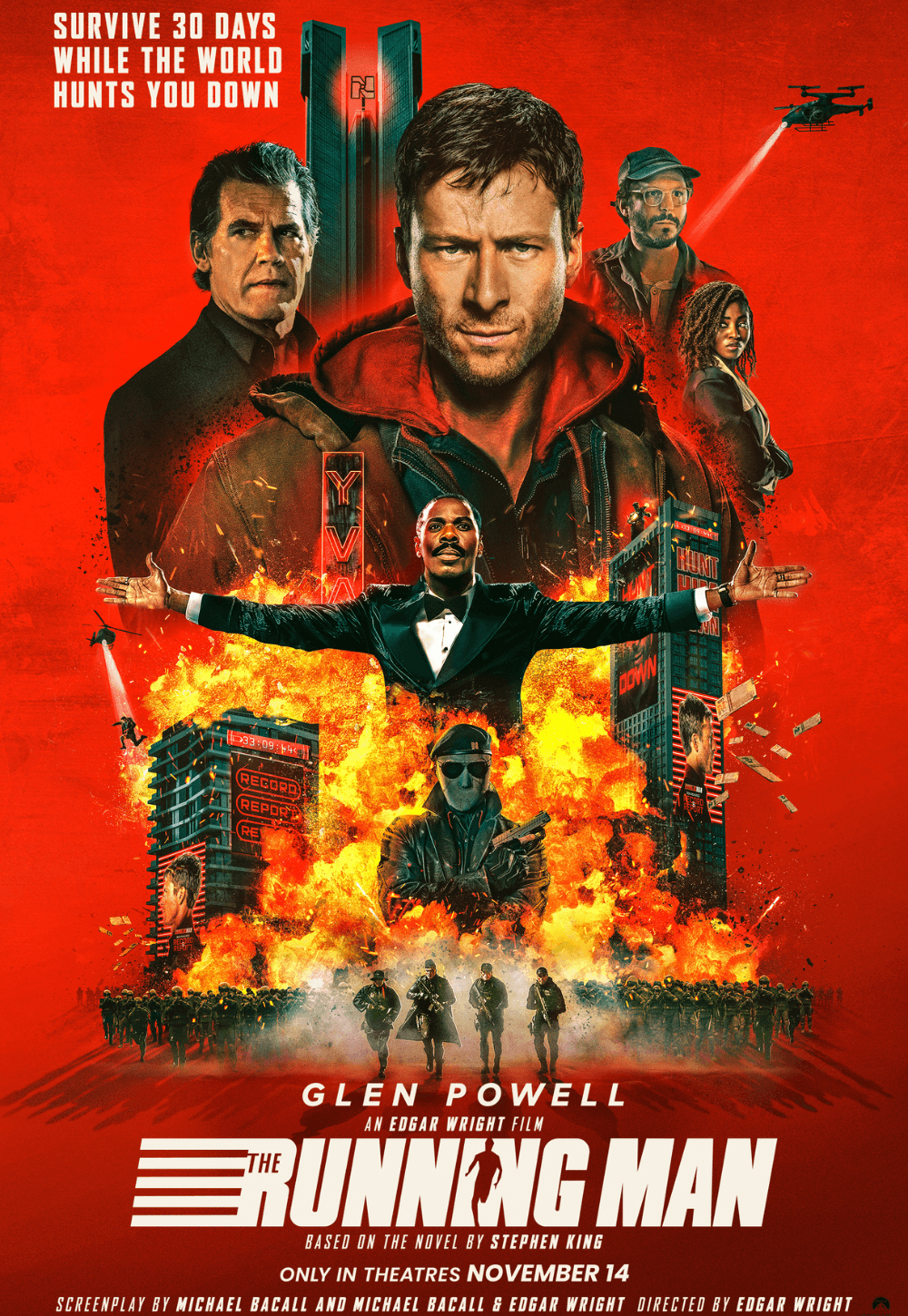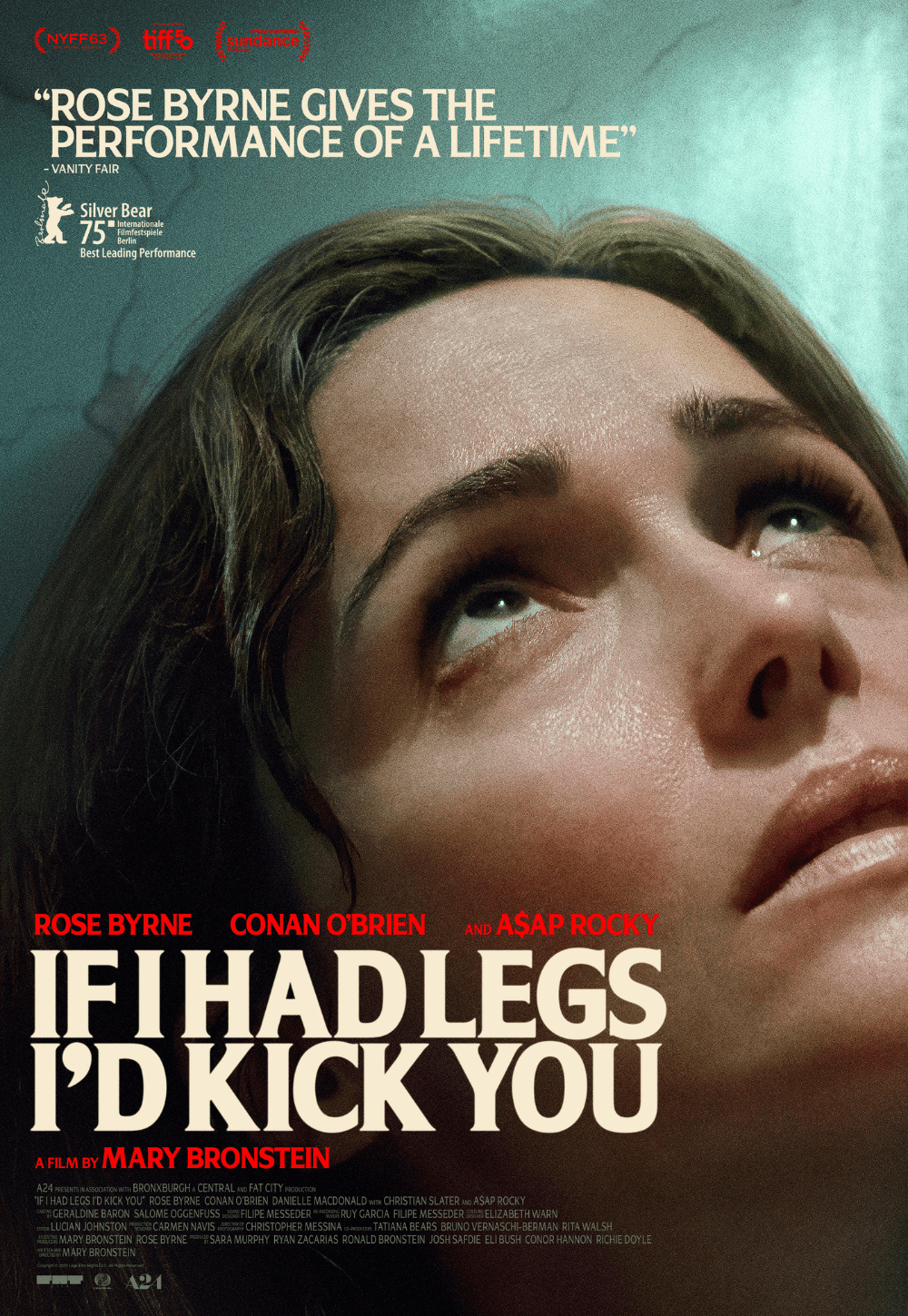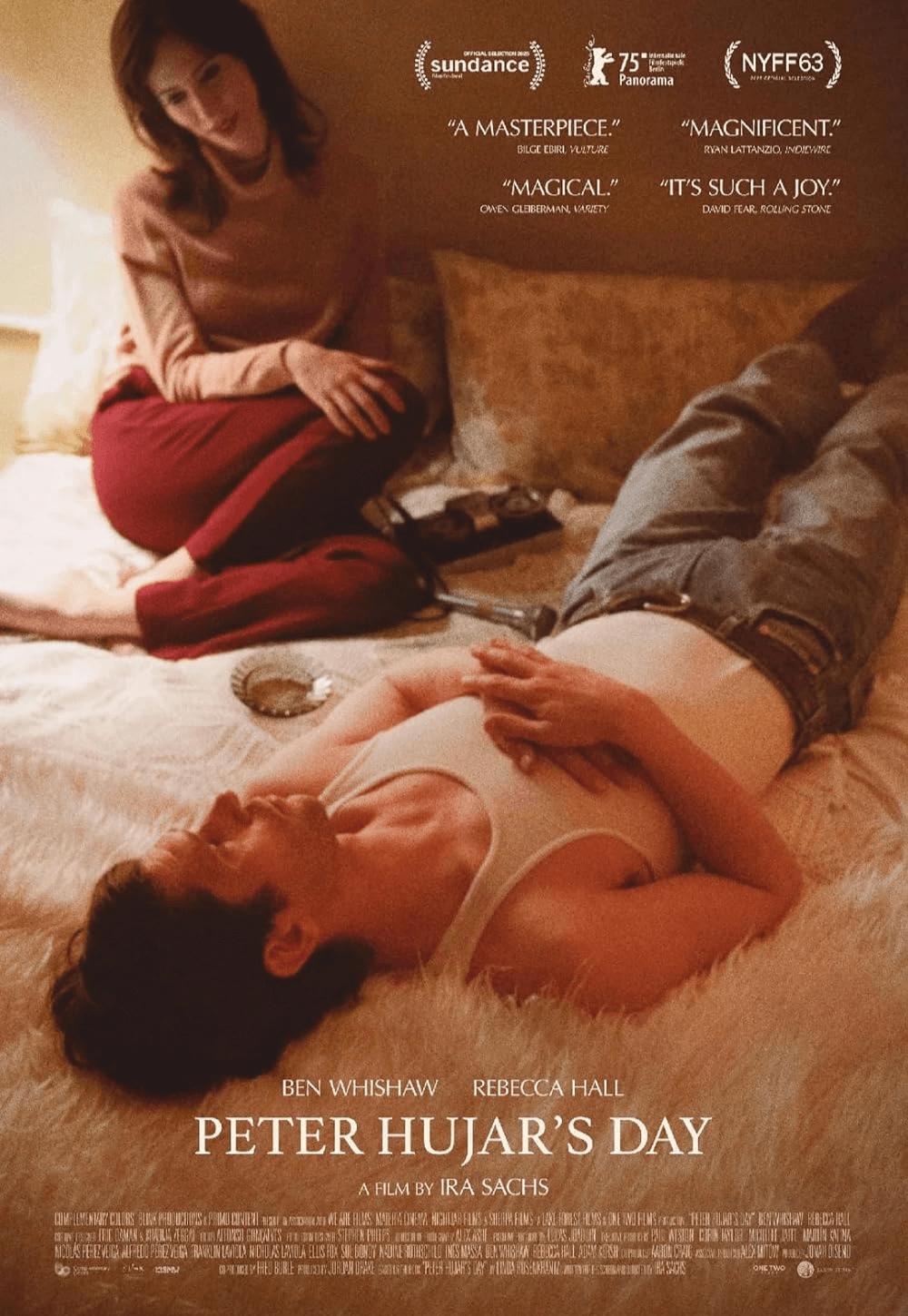
The Stuff
By Brian Eggert |
Schlock-meister Larry Cohen satirizes a nation of capitalists and passive consumers in The Stuff, a low-budget horror-comedy from 1985. Mostly forgotten today outside of cult circles and horror enthusiasts, Cohen’s film conceals nothing, not its cynicism toward American shoppers, not its view of corporate greed, not its hatred of capitalist politics. Drawing from gloopy fright films such as The Blob (1958) and social commentaries steeped in genre, such as Soylent Green (1973), Cohen, as always, has more on his mind than just blood and guts—although, his production boasts plenty of horrific sights to satiate fans of the ambitious practical effects of the ‘80s. Cohen set his crosshairs on everything from advertising to commercialized nutrition to military extremism here, sometimes lashing out in an unfocused rage. And while George A. Romero, Tommy Lee Wallace, and John Carpenter made more entertaining and thoughtful films with a comparable message—see Dawn of the Dead (1978), Halloween III: Season of the Witch (1982), and They Live (1988), respectively—Cohen’s biting commentary on Reagan-era conformity and consumerism in America has plenty to say, even if the plot relies on a conventional conspiracy setup. Viewers today won’t likely buy into the corny horror elements, but its humor, both intentional and unintentional, makes for a fun late-night watch.
When miners find a yummy-tasting white goo surfacing from beneath the earth in a bubbling glob, it’s eventually packaged and sold to Americans as a yogurt-like treat. (Warning Kids: If you see white goo, or anything else for that matter, oozing from underground, do not eat it.) Dubbed The Stuff and marketed with the tagline “Enough is never enough” in hilariously convincing commercials and on brightly colored cartons, this zero-calorie snack sees immediate high sales, causing other dessert companies to shut down. But habitual eaters are subject to the film’s tagline: “Are you eating it? Or is it eating you?” Indeed, those who jump on The Stuff bandwagon become hosts to the seemingly conscious alien blob, which abandons, or even consumes, the human body it’s inhabited when exposed. The effects used in such scenes have a B-movie charm about them that provoke smiles before laughs, but that’s part of the fun. Cohen horror output often contains a touch of absurdity, and The Stuff may be the prime example.
 Cohen introduces us to the film’s huckster hero in a hilarious scene: Michael Moriarty plays an ex-FBI agent turned corporate saboteur, David “Moe” Rutherford, who’s hired by struggling ice cream executives to discover The Stuff’s safely guarded formula. When they meet to discuss his plan of attack, this hysterically obnoxious bumpkin enters the room, complete with mumbling good ol’ boy twang, and shakes the hands of executive types. Owning them with his confidence, Moe observes with each shake, “Sweaty palm… Another sweaty palm…” And in case you were wondering why he goes by “Moe”—and if you’re not curious, he’ll tell you anyway—it’s because “No matter how much I get, I always want mo’.” It’s worth speculating whether the Wayans brothers owe Larry Cohen and Moe Rutherford credit for coining the popular phrase “mo’ money!” on In Living Color (1990-1994) and the subsequent film, Mo’ Money (1992). In any case, Moriarty has a million priceless quips (or dad jokes) like this throughout, and he delivers each snarky comeback with deadpan perfection. Some are genuinely funny; most are funny for the wrong reasons.
Cohen introduces us to the film’s huckster hero in a hilarious scene: Michael Moriarty plays an ex-FBI agent turned corporate saboteur, David “Moe” Rutherford, who’s hired by struggling ice cream executives to discover The Stuff’s safely guarded formula. When they meet to discuss his plan of attack, this hysterically obnoxious bumpkin enters the room, complete with mumbling good ol’ boy twang, and shakes the hands of executive types. Owning them with his confidence, Moe observes with each shake, “Sweaty palm… Another sweaty palm…” And in case you were wondering why he goes by “Moe”—and if you’re not curious, he’ll tell you anyway—it’s because “No matter how much I get, I always want mo’.” It’s worth speculating whether the Wayans brothers owe Larry Cohen and Moe Rutherford credit for coining the popular phrase “mo’ money!” on In Living Color (1990-1994) and the subsequent film, Mo’ Money (1992). In any case, Moriarty has a million priceless quips (or dad jokes) like this throughout, and he delivers each snarky comeback with deadpan perfection. Some are genuinely funny; most are funny for the wrong reasons.
Elsewhere, youngster Jacob (Scott Bloom) witnesses The Stuff moving on its own in his family’s fridge. He tries to warn the others by launching an attack on a grocery store aisle, but it’s too late—his family has already turned into mindless drones, or “Stuffies” as they’re called here, recalling pod people from Invasion of the Body Snatchers (1978). Meanwhile, Moe’s investigation and pseudo-suave attitude earn him a few friends, Jacob included. First, there’s former cookie mogul “Chocolate Chip Charlie” Hobbs (SNL alumnus Garrett Morris, lampooning Famous Amos), whose random martial arts expertise affords more than one laugh. Marketing guru Nicole Kendall (Andrea Marcovicci) devised The Stuff’s successful campaign, but she’s riddled with guilt once she learns it’s brainwashing people to eat a mind-controlling organism. And, of course, Moe beds her without fail. This foursome teams with wildly racist militia nutso, Colonel Malcolm Spears (Paul Sorvino), who agrees to save America and attack The Stuff at its mining center. Spears also broadcasts about its dangers to the public on his private radio station. Danny Aiello appears briefly as an FDA executive.
Much of these throwaway plot elements and characters are difficult to suffer through, but Cohen’s sense of humor and no-holds-barred satiric edge makes up for a meandering script. I knew that Cohen had stolen my heart when, after Americans learn The Stuff is dangerous, he depicts a mob blowing up a Stuff shoppe next to a Mcdonald’s—the real enemy in Cohen’s mind. His none-too-subtle approach is apparent in several riotous mock commercials for The Stuff, including one where Clara Peller, the face of the “Where’s the Beef?” campaign, appears with Abe Vigoda in a restaurant and asks, “Where’s the Stuff?” These moments force us to consider how food products are sold to us, what they’re made of, and what effect they have on our bodies. In this respect, The Stuff would make a fitting inclusion in a movie marathon about nutritional awareness, ethical eating, and socially responsible consumerism, right alongside Supersize Me (2004), Food, Inc. (2008), and The Informant! (2009).
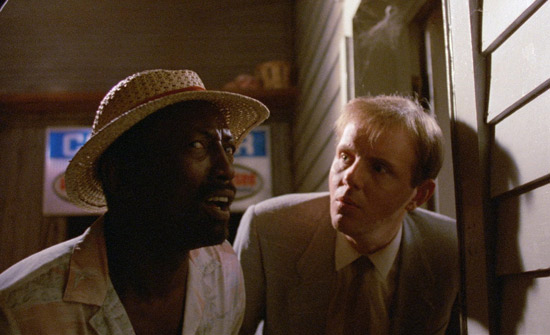 Much about Cohen’s plotting comes out of left field, and few of these elements work together in a congruous way that today’s audiences will appreciate. He never seems entirely sure if what he’s making is a comedy, horror movie, or satire, and we feel that in every frame. But the absurdly unexpected is part of The Stuff’s charm and a recurring tonal quality of Cohen’s work. Consider the bizarro nature of his sophomore horror effort, It’s Alive from 1974, where a woman gives birth to a mutant baby who transforms the proceedings, albeit momentarily, into baby-slasher fare (Cohen made a whole trilogy of killer baby movies). And yet, however ridiculous the concept, Cohen manages to legitimize the story’s emotional weight by focusing on a broken father. God Told Me To (1976) begins as a procedural about a series of killings perpetuated by people who claim they were told by God to commit murder, but then it spirals into tale about a gender-defying interdimensional alien. In 1983’s Q: The Winged Serpent, Cohen follows an Aztec dragon that nests atop the Chrysler Building and decapitates New Yorkers. Each film is unpredictable and, in conventional terms, disjointed. But that’s Cohen, and his fans, this critic included, wouldn’t want him any other way.
Much about Cohen’s plotting comes out of left field, and few of these elements work together in a congruous way that today’s audiences will appreciate. He never seems entirely sure if what he’s making is a comedy, horror movie, or satire, and we feel that in every frame. But the absurdly unexpected is part of The Stuff’s charm and a recurring tonal quality of Cohen’s work. Consider the bizarro nature of his sophomore horror effort, It’s Alive from 1974, where a woman gives birth to a mutant baby who transforms the proceedings, albeit momentarily, into baby-slasher fare (Cohen made a whole trilogy of killer baby movies). And yet, however ridiculous the concept, Cohen manages to legitimize the story’s emotional weight by focusing on a broken father. God Told Me To (1976) begins as a procedural about a series of killings perpetuated by people who claim they were told by God to commit murder, but then it spirals into tale about a gender-defying interdimensional alien. In 1983’s Q: The Winged Serpent, Cohen follows an Aztec dragon that nests atop the Chrysler Building and decapitates New Yorkers. Each film is unpredictable and, in conventional terms, disjointed. But that’s Cohen, and his fans, this critic included, wouldn’t want him any other way.
Cohen is quoted in Michael Doyle’s book, Larry Cohen: The Stuff of Gods and Monsters, saying that The Stuff was inspired after he read several news stories about recalls of food products: “I was constantly reading in the newspapers about various goods and materials being recalled because they were harming people. For example, you had foods being pulled off the market because they were hazardous to people’s health.” Cohen proved ahead of his time by using movies to question what American shoppers were putting into their bodies—not that anyone wanted to hear his message. Produced by Roger Corman’s New World Pictures, the film was sold to them as a horror movie, but Cohen’s approach resulted in a satirical bent that upset the studio. Frustrated with Cohen’s footage, the studio cut down the writer-director’s humor and advertised The Stuff as the latest melty horror extravaganza. Even on a modest budget of under $2 million, the film lost money, having baffled audiences who weren’t expecting a consumer satire with gooey effects.
Panned by most critics, The Stuff continues to improve with age and has found a devoted audience thanks to home video rentals and physical media sales. What’s more, every time another food company makes headlines for the discovery of harmful chemicals or not-as-advertised ingredients in their products, Cohen’s film comes to mind. Unlike many commercial ‘80s horror movies, from Fright Night (1985) to the barrage of slasher sequels, there’s been no wider reassessment of Cohen’s movie that has reconsidered it as a mainstream property (don’t expect a Hollywood remake). But no matter how mish-mashed it feels at times, The Stuff continues to work on levels of transgressive schlock and pure satire. My positive review and recommendation come with a few qualifiers, of course, as viewers expecting a greater concentration on horror will feel let down. This is a movie to be cherished with a grain of salt, watching with a detachment toward the events to examine Cohen’s commentary and the often humorous ways he makes his argument. It’s a cartoonish but also thoughtful movie, and it’s always a source of entertainment and admiration for Cohen’s ambitious ideas.
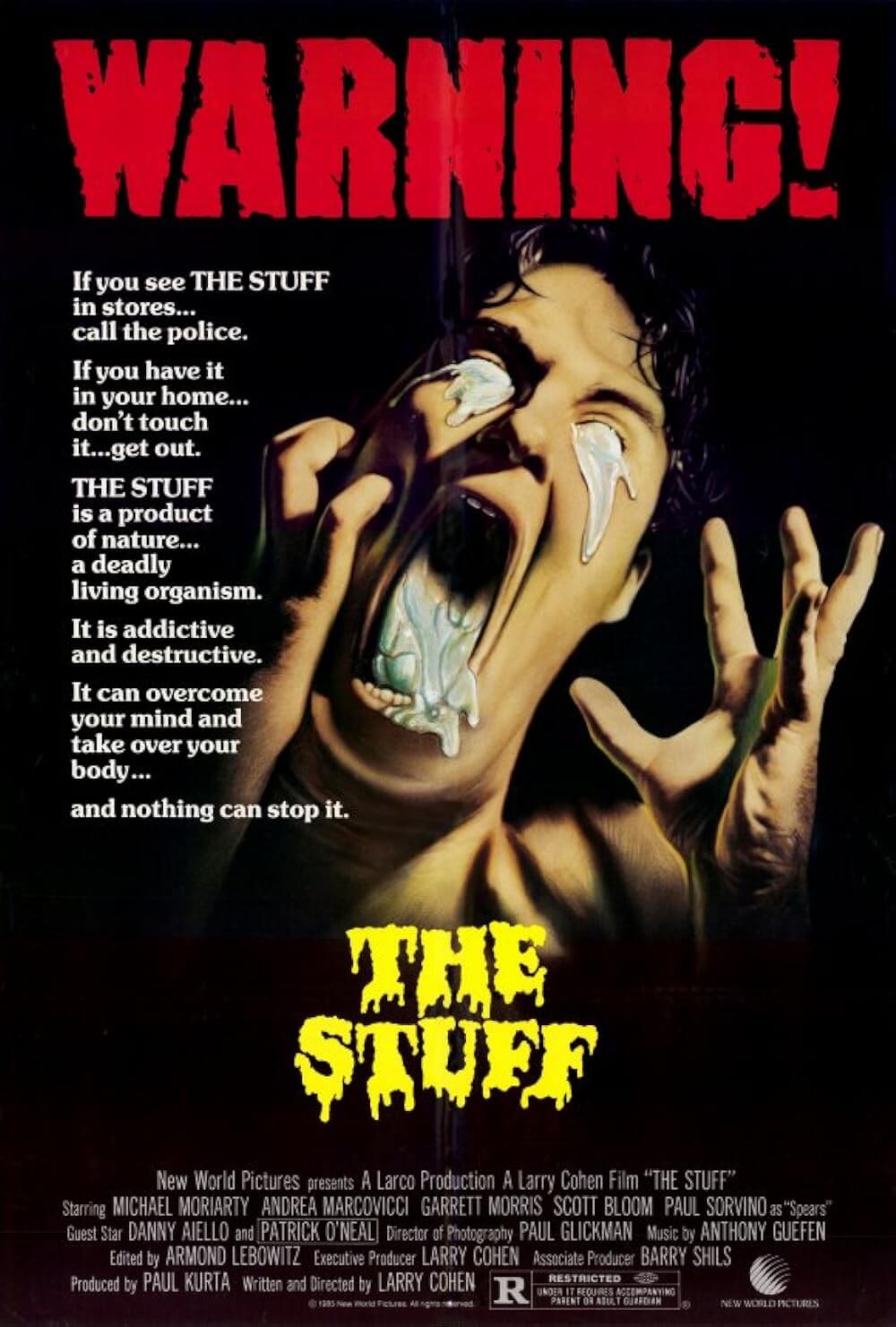
If You Value Independent Film Criticism, Support It
Quality written film criticism is becoming increasingly rare. If the writing here has enriched your experience with movies, consider giving back through Patreon. Your support makes future reviews and essays possible, while providing you with exclusive access to original work and a dedicated community of readers. Consider making a one-time donation, joining Patreon, or showing your support in other ways.
Thanks for reading!
Brian Eggert | Critic, Founder
Deep Focus Review


